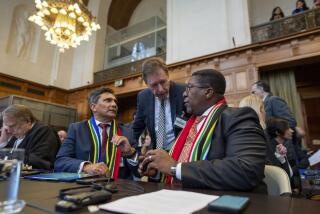U.N. Readies Demand for Damages From Iraq : Gulf crisis: The Security Council resolution would benefit countries harmed by Kuwait invasion.
- Share via
UNITED NATIONS — The five permanent members of the United Nations Security Council have reached general agreement on a resolution demanding that Iraq pay other countries for damages suffered by its invasion of Kuwait, diplomats said Thursday.
Final wording was being polished in Washington and other capitals before the draft resolution is presented to the 10 other members of the council.
The measure also would call on Iraq to allow the resupply of Western embassies in Kuwait city and ask U.N. Secretary General Javier Perez de Cuellar to gather information on the mistreatment of citizens and foreigners living in Kuwait.
In addition, the draft resolution asks that governments supply data on behalf of citizens who have suffered financial losses because of the invasion. But the precise means of assessing Iraq for such damages has not been spelled out.
“It is designed to help keep up the pressure,” said one diplomat from a nonaligned nation with Security Council status who is familiar with the resolution worked out among the United States, Britain, China, the Soviet Union and France.
Several nations have suffered major economic losses because of the seizure of Kuwait, including Jordan, India, Sri Lanka and Bangladesh.
The precise wording of the new resolution was still being worked out late Thursday.
“It isn’t even completely OKd by the United States,” said one member of the Yemen delegation who had seen a draft. “I think the United States has some revisions.”
He said that although the United States was preparing to try to push for a quick consensus in the council, the process among nonaligned council members could take time.
“I don’t think we will work on the weekend. There is nothing serious,” he said.
According to the draft resolution, President Saddam Hussein’s government would not be responsible for punitive damages, only compensation.
Only a handful of foreign embassies still are operating in Kuwait city in defiance of the Hussein regime, and water, electricity and shipments of supplies have been cut off. According to the wife of a top U.S. diplomat, the few remaining Americans still had stored water and were eating a monotonous diet of rice and tuna.
The pressure for a new resolution against Iraq came as Perez de Cuellar continued to try to clarify ways in which a U.N. fact-finding mission to Jerusalem would be accepted by the Israeli government. The Security Council voted last Friday to condemn Israel for the killing of 21 Palestinians in Jerusalem last week and requested Perez de Cuellar to send a mission to investigate.
But the Israeli government has made it clear such a mission is not welcome. For almost a week, diplomats have been working behind the scenes to find a compromise.
In Washington, Secretary of State James A. Baker III defended U.S. support for the U.N. resolution condemning Israel during a sometimes heated exchange with members of the House Foreign Affairs Committee.
“You are saying that the resolution was unbalanced,” Baker told Rep. Eliot L. Engel (D-N.Y.). “I have to tell you that the (Israeli) response (to Arab rioting on Temple Mount) was unbalanced, and the resolution condemned the response. We think the response was excessive. There is no excuse for what happened.”
California Rep. Mel Levine (D-Santa Monica) issued a blistering statement accusing the Administration of “allowing longstanding Arab hatred of Israel to dictate American policy and drive a wedge between the U.S. and Israel.” He said Administration policy created a link between the Arab-Israel conflict and the gulf crisis.
Goldman reported from the U.N. and Kempster from Washington.
More to Read
Sign up for Essential California
The most important California stories and recommendations in your inbox every morning.
You may occasionally receive promotional content from the Los Angeles Times.













